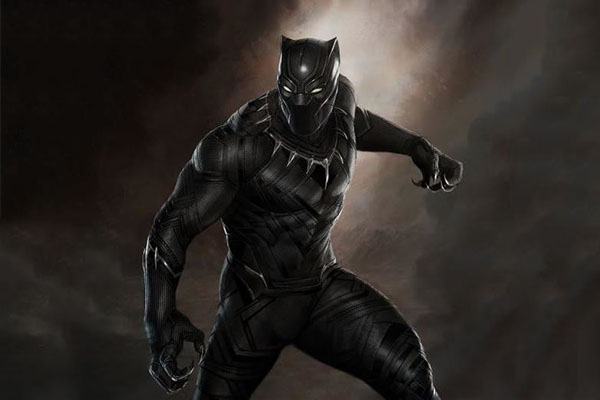Black Panther intrigues audience, unique celebration of black culture

KILLER KING: Baring his claws, newly crowned king, T’Challa (Chadwick Boseman), puts on his panther suit. T’Challa’s role as the black panther is to protect his home of Wakanda.
March 16, 2018
Wakandan sunsets are the most beautiful in the world. At least, that’s what Erik Killmonger’s (Michael B. Jordan) father tells him.
Those who watch Black Panther will attest to the country’s allure. Never colonized by Europeans and hidden in plain sight, the fictional country of Wakanda sits in the heart of Africa, with its riches – accumulated by possession of vibranium, the strongest and rarest metal in the world – unbeknownst to the outside world. The country pits nature against the future: waterfalls cascade among lush green forests as people walk beneath high-tech train tracks. The environment, it seems, is bested only by its characters.
When crown prince T’Challa (Chadwick Boseman) is thrust onto the Wakandan throne after his father’s death, he is confronted by theft of precious vibranium by Ulysses Klaue (Andy Serkis) and the electric entrance of Jordan’s Killmonger. Accompanied by several companions such as his ex-girlfriend and spy, Nakia (Lupita Nyong’o) and unlikely ally FBI Agent Ross (Martin Freedman), T’Challa takes on the struggles of his newfound role.
In a franchise already rife with completed trilogies (i.e. Captain America) and new origin stories (Spider-Man), Black Panther easily holds its own. The defining characteristic is Killmonger – a villain whose emotions and motives ooze with the sincerity and complexity typically reserved only for heroes. Michael B. Jordan executes this role perfectly. Ferocity and anger coexist with loss and a fight for justice. It’s a cause that audiences might not agree with, but will undoubtedly empathize with.
The collision of T’Challa’s and Killmonger’s heartbreakingly identical and opposite circumstances create a dynamic plot that injects humanity into a flawlessly executed comic book conflict.
Joe Robert Cole and Ryan Coogler’s screenplay, combined with Coogler’s direction, effortlessly weaves the CGI-rendered environment and breathtaking action of any superhero film with examination of heavy topics like colonialism’s impact and black diaspora.
For example, the movie’s opening and closing sequences take place in Oakland, California. This setting – a poor and violent inner-city – stands completely contrary to Wakanda. In these starkly different settings, viewers are not able to separate the black lives in two places across the world. They are forced instead to contemplate tangible issues that exist outside the four walls of film.
The combination of superhero action with black cultural analysis makes for a sorely-needed piece of art – one that entertains and contemplates. Its genius is in its complexity. If one chooses to ignore an aspect, they miss out entirely on its beauty. Breathtaking and new, like a Wakandan sunset.


